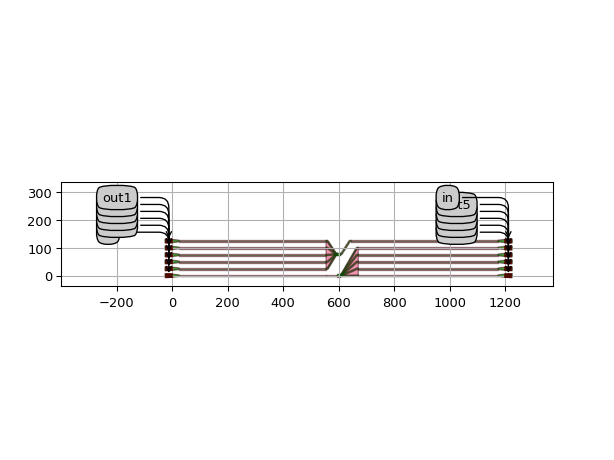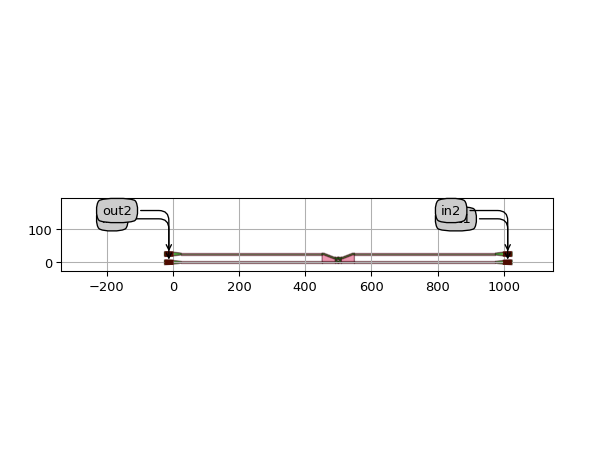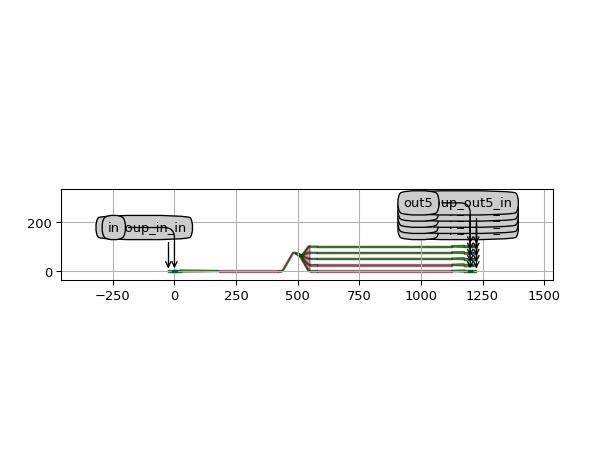IoFibcoupEastWest
- class picazzo3.container.iofibcoup.IoFibcoupEastWest
Adapter for grating fiber couplers East and West.
The component East and West ports are treated separately, and routed towards the East and West, respectively. For this routing, they go through several steps. The settings for the East and West grating couplers can be tuned.
Here, we discuss the use for the East ports, but a similar set of parameters is available for the West ports.
First of all, the ports of the component are transitioned to a common trace template
east_trace_template. By default, it uses the standard waveguide definition defined inTECH.PCELLS.WG.DEFAULT. However, if set toNone, the trace will use the trace template of the actual port. The same holds foreast_transition_length. This can be manually specified by the user, but if a value in the list is set toNone, the default length of that type of transition will be used.Then, the ports are fanned out to the fixed
y_spacingof the fiber couplers. The length of that Fanout can be specified througheast_fanout_length. Similarly, bend radius and rounding algorithm can be set through the parameterbend_radiusandrounding_algorithm. Ifwest_bundle_tracesisTrue, the cover layers will be drawn over the Fanout. This can help reduce DRC errors.Then, the waveguides are transitioned to another waveguide template, specified in
east_connect_trace_template. By default, this is the same template aseast_trace_template, but it is possible to override it to use a lower loss multi-mode waveguide. The connection for which this waveguide is used is a simple straight connection, but depending on the chip layout it can have a long length. The transition length can be manually specified using theeast_connect_transition_length.At the output, the waveguides are transitioned to the waveguide template of the individual input and output fiber couplers. The transition length from the connection waveguide to the grating coupler can be specified using
east_fiber_coupler_transition_length.Finally, the circuit is terminated with fiber couplers, using the PCell specified in
east_fiber_coupler
The same procedure and parameters are used for the west ports
- Parameters:
- west_trace_template: ( PCell and _WaveguideTemplate ), *None allowed*
The trace template that will be used for the Fanout of the West ports. If ‘None’, the trace template of the individual port will be used. Defaults to
TECH.PCELLS.WG.DEFAULT.- east_trace_template: ( PCell and _WaveguideTemplate ), *None allowed*
The trace template that will be used for the Fanout of the East ports. If ‘None’, the trace template of the individual port will be used. Defaults to
TECH.PCELLS.WG.DEFAULT.- east_fiber_coupler_external_port_name_map: str
Dicts to map the names of the East fiber coupler ports that will be exposed as external ports. The dict is of the form {‘port_name_on_termination’: ‘unique_external_port_name’, …}. the ‘unique_external_port_name’ string can contain the identifier {port}, which will be replaced by the corresponding port name on the component. For example, the default is {‘vertical_in’ : ‘{port}’}, which will map the port ‘vertical_in’ of the fiber coupler to the name of port on the component.
- west_fiber_coupler: PCell
Fiber coupler to be attached to the West ports. Defaults to
TECH.IO.FIBCOUP.DEFAULT.PCELLS.DEFAULT_GRATING- east_fiber_coupler: PCell
Fiber coupler to be attached to the East ports. Defaults to
TECH.IO.FIBCOUP.DEFAULT.PCELLS.DEFAULT_GRATING- west_connect_trace_template: ( PCell and _WaveguideTemplate ), *None allowed*
The trace template that will be used for connecting the Fanout of the West ports. to the Grating couplers. If ‘None’, the trace template of the individual port will be used. Defaults to the same as
west_trace_template.- east_connect_trace_template: ( PCell and _WaveguideTemplate ), *None allowed*
The trace template that will be used for connecting the Fanout of the East ports. to the Grating couplers. If ‘None’, the trace template of the individual port will be used. Defaults to the same as
east_trace_template.- west_fiber_coupler_external_port_name_map: str
Dicts to map the names of the West fiber coupler ports that will be exposed as external ports. The dict is of the form {‘port_name_on_termination’: ‘unique_external_port_name’, …}. the ‘unique_external_port_name’ string can contain the identifier {port}, which will be replaced by the corresponding port name on the component. For example, the default is {‘vertical_in’ : ‘{port}’}, which will map the port ‘vertical_in’ of the fiber coupler to the name of port on the component.
- west_fiber_coupler_port_labels: List with type restriction, allowed types: <class ‘str’>
Port labels of the West fiber couplers connected to the ports of the contents. For fiber couplers with more than one port, the port labels should be concatenated with a ‘,’. For example, when using 2D grating couplers, the ports could be [‘in1,in2’, ‘in’]. This will use ports ‘in1’ and ‘in2’ of the first grating coupler, and ‘in’ of the second.By default, all the East ports of the fiber coupler are used. If an entry in the list is ‘None’, also the East ports of that fiber coupler are used. The number of entries in the list should not be identical to the number of West port. If the component has fewer West ports, only the first entries in the list will be used. If the component has more West ports, the list is just recycled. Therefore, it is allowed to use a list of just one element for multiple ports.
- east_fiber_coupler_port_labels: List with type restriction, allowed types: <class ‘str’>
Port labels of the East fiber couplers connected to the ports of the contents. For fiber couplers with more than one port, the port labels should be concatenated with a ‘,’. For example, when using 2D grating couplers, the ports could be [‘in1,in2’, ‘in’]. This will use ports ‘in1’ and ‘in2’ of the first grating coupler, and ‘in’ of the second.By default, all the West ports of all the fiber couplers are used. If an entry in the list is ‘None’, also the west ports of that fiber coupler are used. The number of entries in the list should not be identical to the number of East port. If the component has fewer East ports, only the first entries in the list will be used. If the component has more East ports, the list is just recycled. Therefore, it is allowed to use a list of just one element for multiple ports.
- west_port_labels: ( List with type restriction, allowed types: <class ‘str’> ), *None allowed*
Labels of the ports to directed to the West. Set to None to process all West ports.
- east_port_labels: ( List with type restriction, allowed types: <class ‘str’> ), *None allowed*
Labels of the ports to directed to the East. Set to None to process all East ports.
- external_port_names: str
Dictionary for remapping of the port names of the contents to the external ports
- contents: PCell
the contents of the container: the child cell
- name: String that contains only ISO/IEC 8859-1 (extended ASCII py3) or pure ASCII (py2) characters
The unique name of the pcell
- Other Parameters:
- west_trace_templates: List with type restriction, allowed types: <class ‘ipkiss3.pcell.cell.pcell.PCell’>, locked
- east_trace_templates: List with type restriction, allowed types: <class ‘ipkiss3.pcell.cell.pcell.PCell’>, locked
- west_connect_trace_templates: ( List with type restriction, allowed types: <class ‘ipkiss3.pcell.cell.pcell.PCell’> ), locked, *None allowed*
- east_connect_trace_templates: ( List with type restriction, allowed types: <class ‘ipkiss3.pcell.cell.pcell.PCell’> ), locked, *None allowed*
- west_fiber_coupler_external_port_name_maps: locked
- west_fiber_couplers: List with type restriction, allowed types: <class ‘ipkiss3.pcell.cell.pcell.PCell’>, locked
- east_fiber_coupler_external_port_name_maps: locked
- east_fiber_couplers: List with type restriction, allowed types: <class ‘ipkiss3.pcell.cell.pcell.PCell’>, locked
- port_labels: locked
Examples
"""This example illustrates how the IoFibcoupEastWest properties can customize the routing in an IoColumn.""" import si_fab.all as pdk # noqa: F401 from ipkiss3 import all as i3 from picazzo3.filters.mmi import MMIIdentical from picazzo3.traces.wire_wg import WireWaveguideTemplate wg_t1 = WireWaveguideTemplate() wg_t1.Layout(core_width=7.0, cladding_width=8.0) my_mmi = MMIIdentical(mmi_trace_template=wg_t1, n_inputs=1, n_outputs=5) my_mmi.Layout(length=10.0, input_y_positions=[-1.0], output_y_positions=[-2.0, -1.0, 0.0, 1.0, 2.0]) from picazzo3.container.iofibcoup import IoFibcoupEastWest from ipkiss3.pcell.blocks.iocolumn import IoColumn my_column = IoColumn(name="iocol", adapter=IoFibcoupEastWest, max_n_o_lines=100) my_column.Layout(south_east=(1200.0, 0.0)) my_column.add(my_mmi) my_column.add(my_mmi, relative_offset=(0.0, 50.0), transformation=i3.Rotation(rotation=180.0)) layout = my_column.Layout() layout.visualize(annotate=True)

Views
- class Layout
- Parameters:
- west_connect_transition_length: ( float and int, float, integer, floating and number >= 0 ), *None allowed*
The lengths of the transitions between the West fanout ports and the straight connection traces to the fiber coupler. If ‘None’, the default length for that type of transition is used.
- east_connect_transition_length: ( float and int, float, integer, floating and number >= 0 ), *None allowed*
The lengths of the transitions between the East fanout ports and the straight connection traces to the fiber coupler. If ‘None’, the default length for that type of transition is used.
- west_fiber_coupler_transformation: GenericNoDistortTransform
Transformation of the West fiber coupler, relative to the y_spacing grid of the adapter. By default, no transformation is applied.
- east_fiber_coupler_transformation: GenericNoDistortTransform
Transformation of the East fiber coupler, relative to the y_spacing grid of the adapter. By default, a Horizontal Mirroring is applied.
- west_transition_length: ( float and int, float, integer, floating and number >= 0 ), *None allowed*
The lengths of the transitions between the West ports of the component and the traces of the Fanout. If ‘None’, the default length for that type of transition is used.
- east_transition_length: ( float and int, float, integer, floating and number >= 0 ), *None allowed*
The lengths of the transitions between the East ports of the component and the traces of the Fanout. If ‘None’, the default length for that type of transition is used.
- west_max_s_bend_angle: float and number > 0 and ]0.0,90.0]
Maximum angle for the S-bend in the fanout of the West ports.
- east_max_s_bend_angle: float and number > 0 and ]0.0,90.0]
Maximum angle for the S-bend in the fanout of the East ports.
- west_fanout_length: ( float and number > 0 ), *None allowed*
Length of the Fanout section of the West ports. If None the length will be chosen automatically.If the required length is larger than the specified length, additional space will be used.
- east_fanout_length: ( float and number > 0 ), *None allowed*
Length of the Fanout section of the East ports. If None the length will be chosen automatically.If the required length is larger than the specified length, additional space will be used.
- west_fiber_coupler_transition_length: ( float and int, float, integer, floating and number >= 0 ), *None allowed*
The length of the transition between the West straight connection traces and the fiber coupler. If ‘None’, the default length for that type of transition is used.
- east_fiber_coupler_transition_length: ( float and int, float, integer, floating and number >= 0 ), *None allowed*
The length of the transition between the East straight connection traces and the fiber coupler. If ‘None’, the default length for that type of transition is used.
- west_max_s_bend_angles: ]0.0,90.0]
Maximum angle for the S-bend in the fanout of the West ports.
- east_max_s_bend_angles: ]0.0,90.0]
Maximum angles for the S-bend in the fanout of the East ports.
- west_bundle_traces:
Combine the Fanout waveguides on the West in a bundle (adding Cover layers)?
- west_fanout_lengths: ( number > 0 or None )
Lengths of the waveguides in the Fanout section of the West ports. If an entry in the list is None the lengths will be chosen automatically.If the required length is larger than the specified length, additional space will be used.
- east_bundle_traces:
Combine the Fanout waveguides on the east in a bundle (adding Cover layers)?
- east_fanout_lengths: ( number > 0 or None )
Lengths of the waveguides in the Fanout section of the East ports. If an entry in the list is None the lengths will be chosen automatically.If the required length is larger than the specified length, additional space will be used.
- relative_offset: Coord2
Offset of the component as it is positioned by absolute_offset
- absolute_offset: Coord2
Offset of the component from the (0,0) of the adapter.By default this offset will be calculated such that the component ports areX-aligned around the center and that the first West port is Y-aligned to the south_west.This is after the
contents_transformationhas been applied.- contents_transformation: GenericNoDistortTransform
transformation to apply to the contents
- flatten_contents:
if True, it will insert the contents as elements in the layout, rather than as an Instance
- outline_layer: __Layer__
Layer on which to draw the block outline. Defaults to PPLayer(TECH.PROCESS.NONE, TECH.PURPOSE.BBOX).
- draw_block_outline:
Draw the outline of the block when set to True
- south_east: Coord2
Position of the south east corner of the block. Defaults to (TECH.BLOCKS.DEFAULT_WIDTH, 0.0)
- south_west: Coord2
Position of the south west corner of the block
- y_spacing: float and number > 0
The spacing between blocks
- view_name: String that contains only alphanumeric characters from the ASCII set or contains _$. ASCII set is extended on PY3.
The name of the view
- manhattan:
Adds rectangular blocks in the bends to avoid as much as possible non-manhattan angles.
- angle_step: float and number > 0
Angle step for rounding.
- rounding_algorithm:
Rounding algorithm used to generate the bends. Can be circular, spline, ….
- bend_radius: float and number > 0
Bend radius for the auto-generated bends.
- Other Parameters:
- west_fiber_coupler_transition_lengths: locked
- east_fiber_coupler_transition_lengths: locked
- west_connect_transition_lengths: locked
- east_connect_transition_lengths: locked
- west_transition_lengths: locked
- east_transition_lengths: locked
- west_align_fanout: locked
- east_align_fanout: locked
- west_fiber_coupler_transformations: locked
- east_fiber_coupler_transformations: locked
- south_offset: int, locked
The y-offset between south_west & south_east, measured in units of y_spacing
- width: float and int, float, integer, floating and number >= 0, locked
The width of the block, calculated using south_west & south_east
Examples
"""This example illustrates the default settings of IoFibcoupEastWest , by adding a Ring resonator to the adapter""" import si_fab.all as pdk # noqa: F401 from picazzo3.filters.ring import RingRect180DropFilter my_ring = RingRect180DropFilter() from picazzo3.container.iofibcoup import IoFibcoupEastWest iofb = IoFibcoupEastWest(contents=my_ring) iofb_layout = iofb.Layout() iofb_layout.visualize(annotate=True)

"""This example takes an MMI and encapsulates it in an IoFibcoupEastWest adapter. It customizes several parameters of the adapter for individual tailoring of the East and West outputs.""" import si_fab.all as pdk # noqa: F401 from ipkiss3 import all as i3 from picazzo3.filters.mmi import MMIIdentical from picazzo3.traces.wire_wg import WireWaveguideTemplate # normal waveguide template: single mode wg_t = WireWaveguideTemplate() wg_t.Layout(core_width=0.46) # connect_template: wider to reduce losses wgc_t = WireWaveguideTemplate() wgc_t.Layout(core_width=2.0) # MMI wg_t1 = WireWaveguideTemplate() wg_t1.Layout(core_width=7.0, cladding_width=8.0) # input and output traces of the MMI wg_t2 = WireWaveguideTemplate() wg_t2.Layout(core_width=0.6) my_mmi = MMIIdentical( mmi_trace_template=wg_t1, input_trace_template=wg_t2, output_trace_template=wg_t2, n_inputs=1, n_outputs=5, ) my_mmi.Layout(length=10.0, input_y_positions=[-1.0], output_y_positions=[-2.0, -1.0, 0.0, 1.0, 2.0]) # fiber coupler from picazzo3.fibcoup.uniform import UniformLineGrating my_gc = UniformLineGrating(trace_template=wg_t1) from picazzo3.container.iofibcoup import IoFibcoupEastWest iofb = IoFibcoupEastWest( contents=my_mmi, # the component east_trace_template=wg_t, # trace template for East fanout west_trace_template=wg_t, # trace_template for West fanout east_connect_trace_template=wgc_t, # trace template for wide connections west_connect_trace_template=wgc_t, # trace template for wide connections east_fiber_coupler=my_gc, # fiber coupler East west_fiber_coupler=my_gc, ) # fiber coupler West iofb_layout = iofb.Layout( contents_transformation=i3.Rotation(rotation=-30.0), # rotate the contents east_connect_transition_length=30.0, # transition length # transition length between connection WG and the fiber coupler east_fiber_coupler_transition_length=50.0, south_west=(-0.0, 0.0), # south west corner of the adapter south_east=(1200.0, 0.0), # south east corner of the adapter relative_offset=(-100.0, 70.0), # offset of component from the center. ) iofb_layout.visualize(annotate=True)
